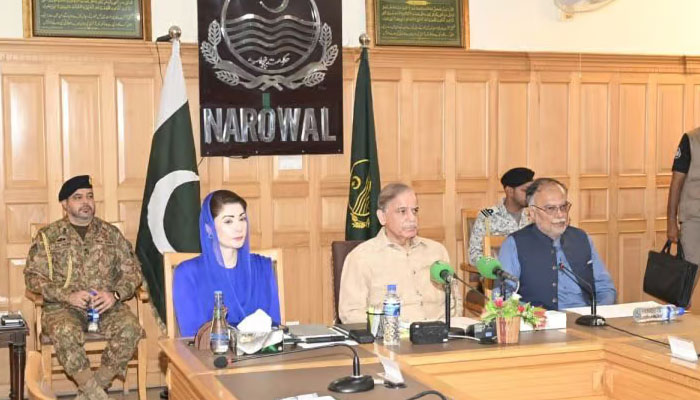PM Shehbaz urges immediate action on water storage infrastructure amid flood crisis
PM stressed that Pakistan must rely on domestic resource mobilization to finance the construction of new dams and water reservoirs.
NAROWAL – Prime Minister Shehbaz Sharif has emphasized the urgent need to enhance Pakistan’s water storage infrastructure to mitigate the severe impacts of flash floods, which continue to threaten lives and livelihoods across the country.
Chairing a high-level meeting to assess the ongoing flood situation, the premier underlined the critical importance of increasing water storage capacity and called for prompt action. “The time for delay is over; we must begin work on enhancing storage capacity immediately,” he stated.
He stressed that Pakistan must rely on domestic resource mobilization to finance the construction of new dams and water reservoirs. In particular, he urged for the swift completion of ongoing mega-projects, including the Diamer Bhasha Dam, to strengthen the country’s ability to manage natural disasters.
Highlighting the evolving nature of the floods — which began in northern Pakistan and have since spread to the plains of Punjab — Prime Minister Shehbaz offered condolences to the families affected by the heavy rains and flooding. He commended the joint efforts of Punjab Chief Minister Maryam Nawaz Sharif, the National Disaster Management Authority (NDMA), Pakistan Army, and various civil departments for their timely response and rescue operations.
He noted that the coordinated approach between federal and provincial authorities had helped reduce the scale of losses. Drawing attention to the catastrophic 2022 floods in Sindh and Balochistan, the prime minister warned that climate change continues to place Pakistan among the countries most at risk for extreme weather events. He called on all government institutions to adopt short-, medium-, and long-term strategies to boost disaster preparedness and resilience.
Punjab Chief Minister Maryam Nawaz Sharif expressed sorrow over the damage caused by the recent floods, including the loss of human lives and agricultural destruction. She assured that there had been no fatalities due to mismanagement or lack of coordination.
Maryam Nawaz lauded the efforts of the NDMA, Provincial Disaster Management Authority (PDMA), police, civil defense teams, and the Pakistan Army, who together managed to evacuate more than 50,000 people. She credited the early warning systems and effective communication strategies for limiting casualties and livestock losses.
In response to flooding around religious sites such as the Gurdwara, she ordered swift water drainage operations. She also announced the activation of field hospitals and the deployment of 1,000 mobile health units to support affected communities. Vaccine supplies were being secured, with particular attention given to vulnerable groups — including children, women, and the elderly.
The chief minister noted that nearly 200 kilometers of road infrastructure had been damaged and instructed authorities to establish temporary routes to restore connectivity quickly. She reaffirmed the province’s commitment to long-term planning, especially in building water storage facilities to reduce future losses and water wastage.
Read more: Shehbaz, Maryam Survey Damage in Flood-Hit Punjab
Planning Minister Ahsan Iqbal also raised concerns over Pakistan’s vulnerability to climate change, arguing that better infrastructure could significantly reduce disaster-related damages. He pointed out that neighboring countries like India suffered less during similar climate events due to their advanced flood management systems.
Iqbal noted that many rural communities had become isolated due to the floods. He emphasized the need for heavy machinery to restore access and deliver essential medical services. Additionally, he urged agricultural banks to offer low-interest loans to support farmers in rebuilding their livelihoods.
Read more: Next 48 hours crucial NDMA issues flood alert for River Ravi
The meeting also included a comprehensive briefing from NDMA Chairman Lt. General Inam Haider, who presented an overview of the flood situation across Punjab and the ongoing relief efforts.


Comments are closed, but trackbacks and pingbacks are open.